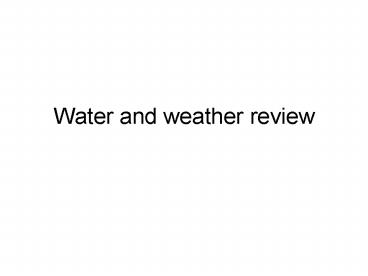Water and weather review PowerPoint PPT Presentation
1 / 20
Title: Water and weather review
1
Water and weather review
2
1. Describe the water Cycle. Draw the cycle.
Explain what happens at each step.
- Evaporation process by which molecules absorb
enough energy to change from liquid to gas - Condensation changing from gas to liquid forms
clouds - Precipitation rain, snow, sleet, hail (any
water that falls from the sky) - Run off- back to land off of mountain tops
3
(No Transcript)
4
2. Define the following terms
- Watershed land area that supplies water to a
river system - Surface Water water found on the surface of the
ground includes rivers, lakes, streams - Ground Water water that is absorbed into the
ground
5
2. Define the following terms
- Permeable materials that allow water to pass
through - Impermeable materials that do NOT allow water
to pass through them - Saturated completely filled with water
6
(No Transcript)
7
2. Define the following terms
- Aquifer an underground layer of rock/sediment
that holds water can be drilled into by a well
for water - Humidity the amount of water vapor in the air
compared to how much water vapor the air can hold
at that temperature - Meteorologist- scientist that studies weather
patterns and tries to predict it
8
3. Use your textbook to draw the weather symbols
- Cold front- brings brief storms and cooler
weather - Stationary front- long periods of precipitation
9
3. Use your textbook to draw the weather symbols
- Warm front- precipitation and warm air
- Occluded precipitation
- High pressure- sunny days, little or no rain,
calm weather - Low pressure- storm, cloudy
10
(No Transcript)
11
(No Transcript)
12
(No Transcript)
13
4. What gases are found in the Atmosphere?
14
p. 453
15
http//www.srh.noaa.gov/srh/jetstream/append/lesso
nplans.htm
16
5 functions of our atmosphere
- 1. stratosphere absorbs ultraviolet radiation
ozone layer (oxygen has 3 molecules) - 2. thermosphere- converts energy from the sun
into heat- makes conditions on Earth suitable for
living things (liquid water, warm air) - 3. Mesosphere burns up meteoroids (protection)
- 4. Exosphere allows communication
- 5. Ionosphere reflects radio waves
17
5. Describe each of the instruments below.
Explain what they are used for in weather
forecasting. What are the units for each?
- Barometer used to measure air pressure 2 kinds
(Mercury Aneroid) units are inches, cm or
millibars - Thermometer used to measure temperature (the
average amount of energy an object has) work
because matter expands when hot contracts when
cold units are degrees Celsius or Fahrenheit
18
5. Describe each of the instruments below.
Explain what they are used for in weather
forecasting. What are the units for each?
- Psychrometer used to measure relative humidity
compares the temperature of a wet dry
thermometer given as a percent - Rain Gauge used to measure the amount of
precipitation in or cm - Anemometer measures wind speed in mph or kmph
wind forms when air moves from high pressure to
low pressure
19
6. Describe the 3 main types of clouds.
- Cumulus clouds puffy clouds that form during
fair weather - cumulonimbus clouds cumulus
clouds that have grown into rain clouds - Stratus clouds low layer clouds that often
cover much of the sky- cause drizzle or rain - Cirrus Clouds wispy, feathery, high clouds-
made from ice crystals
20
(No Transcript)

